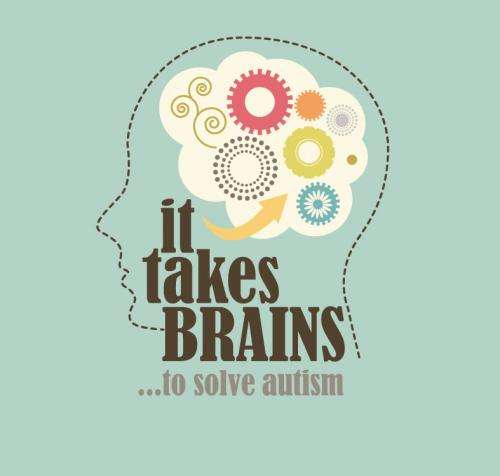It Takes Brains: Autism BrainNet registration site launches

The Simons Foundation, Autism Speaks and the Autism Science Foundation today announced the launch of the Autism BrainNet registration site, It Takes Brains (www.takesbrains.org). Autism BrainNet is a consortium of academic sites funded collaboratively by the Simons Foundation and Autism Speaks to collect, store and distribute brain tissue resources necessary for researchers to understand the underlying neurobiology and genetics of autism.
The pace of autism research has been significantly hindered by a severe shortage of human brain tissue. Important discoveries have already been made thanks to generous donations of brain tissue of individuals with autism. This type of research could lead to a better understanding of the disorder, its treatments and its causes. To date, research has shown that the brains of people with autism seem to be structurally different— possessing different numbers and sizes of neurons— and appear to show increased inflammation compared to brains of typically developing individuals. In addition, shared changes in gene expression have been identified in the brains of people with autism when compared with non-affected individuals. However, none of these findings have received adequate replication, in part due to a lack of adequate samples.
The following institutions will join as inaugural members of the Autism BrainNet and will be collection and storage sites: Harvard University/Beth Israel Deaconess Medical Center in Boston, the Icahn School of Medicine at Mount Sinai in New York City, the University of California MIND Institute in Sacramento, and the University of Texas at Southwestern Medical School in Dallas. Additional sites worldwide are expected to join in the future. Each site will adhere to standard protocols for clinical data and brain acquisition, preparation, storage and distribution to researchers.
Autism Speaks' Autism Tissue Program (ATP) will transition to the Autism BrainNet. Resources from the ATP will continue to be made available through Harvard University in Boston. Communication with ATP donor families will continue through Autism BrainNet, and ATP registrants will be added to the Autism BrainNet database to receive updates on the new program and news about general brain research.
Dr. David Amaral of the University of California MIND Institute will serve as the Director of the Autism BrainNet. "Studies on brain tissue represent the best way for researchers to gain a deeper understanding of the genetic, cellular and molecular causes of autism spectrum disorder," Amaral says. "This research takes us important steps closer to effective treatments that will lessen disability for affected individuals."
"Human brain structure and function is the key to understanding behavior—and identifying differences in the brains of individuals with autism is essential for advancing our understanding of autistic behaviors," said Marta Benedetti, Senior Scientist at the Simons Foundation Autism Research Initiative. "Autism BrainNet will provide the material needed to identify and understand these differences, and will greatly advance our understanding of and the ability to treat autism. Autism BrainNet will also allow researchers to replicate previous findings using new, better-characterized and larger sets of tissue."
"Since it was launched in 1998 the Autism Speaks Autism Tissue Program has been committed to providing the rare and precious resource of brain tissue to many highly qualified scientists," said Autism Speaks chief science officer Robert Ring, Ph.D. "The launch of Autism BrainNet enables us to continue this mission and expand the number of available collection sites and represents an unprecedented investment ensuring that researchers have access to the brain tissue they need to answer the big questions about autism."
Educating families affected by autism is essential to growing Autism BrainNet's tissue resources quickly. It Takes Brains, Autism BrainNet's outreach program, encourages families affected by the disorder to register with Autism BrainNet in the event brain tissue donation is someday relevant to their family. Registrants will receive updates about the ongoing progress of Autism BrainNet.
"My 16-year-old son, Grayson, was a brain tissue donor," says BrainNet family participant Valerie Hund of Livermore, California. "I would encourage any family to register to be donors. Although we could not have anticipated losing our son to a seizure, for us, in that moment, we gave back and did something that felt right— not even knowing that brain tissue is so in demand. So now Grayson can be a pioneer in helping make this next quantum leap in research. Out of something bad, something good came about."
"Most people think brain tissue is included when you register as an organ donor, but it's not," said Alison Singer, president of the Autism Science Foundation. "Every family raising a child with autism needs to think about registering to donate brain tissue in case of a tragedy. Brain tissue research is the best hope we have for understanding what causes autism and developing new and better treatments for individuals with autism."
















